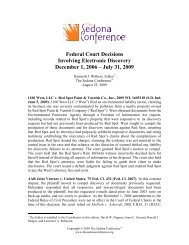Chambers Handbook for Judges - Federal Judicial Center
Chambers Handbook for Judges - Federal Judicial Center
Chambers Handbook for Judges - Federal Judicial Center
Create successful ePaper yourself
Turn your PDF publications into a flip-book with our unique Google optimized e-Paper software.
J. Restrictions on Law Clerks<br />
1. Involvement in Cases of Attorneys with Whom Applications<br />
<strong>for</strong> Employment Are Pending<br />
Application by a law clerk to a firm that has cases pending be<strong>for</strong>e the<br />
judge may create problems <strong>for</strong> the law firm, the judge, and the law<br />
clerk. Practices regarding this matter vary. Some judges instruct their<br />
law clerks not to apply <strong>for</strong> jobs with law firms until near the end of the<br />
clerkship. Others permit applications, but exclude the law clerk from<br />
all matters in which that firm is involved, requiring another law clerk<br />
to handle such matters. The law clerk should learn the judge’s policy<br />
and follow it. In any event, even if no restrictions are placed on a law<br />
clerk’s applications <strong>for</strong> employment, a commonsense rule is that a law<br />
clerk should carefully avoid even the most indirect discussion of cases<br />
pending be<strong>for</strong>e the judge during interviews and other communications<br />
with the firm. When law clerks accept a position with an attorney or<br />
firm, they should cease further involvement in those cases in which<br />
the future employer has an interest.<br />
2. Practice After Termination of a Clerkship: Cases in Which<br />
the Law Clerk Was Involved; Appearances Be<strong>for</strong>e the Judge <strong>for</strong><br />
Whom the Law Clerk Worked<br />
Many courts or individual judges place restrictions on a law clerk’s professional<br />
activities after the end of the clerkship. These may include<br />
prohibitions from ever participating in any <strong>for</strong>m in any case pending<br />
during the law clerkship, or prohibitions from appearing as an attorney<br />
in the court in which the law clerk served, usually <strong>for</strong> one or two<br />
years. The law clerk must determine the policy of both the court and<br />
the judge. In any event, <strong>for</strong>mer law clerks must not participate in a<br />
case in which they per<strong>for</strong>med work of any kind while law clerks. The<br />
ABA’s Model Rules of Professional Responsibility also prohibit lawyers<br />
from representing a client in a case on which the lawyer worked previously<br />
as a public officer or employee. Some courts have adopted rules<br />
relating to these matters, and the law clerk is, of course, bound to follow<br />
these rules.<br />
22 <strong>Chambers</strong> <strong>Handbook</strong> <strong>for</strong> <strong>Judges</strong>’ Law Clerks and Secretaries

















